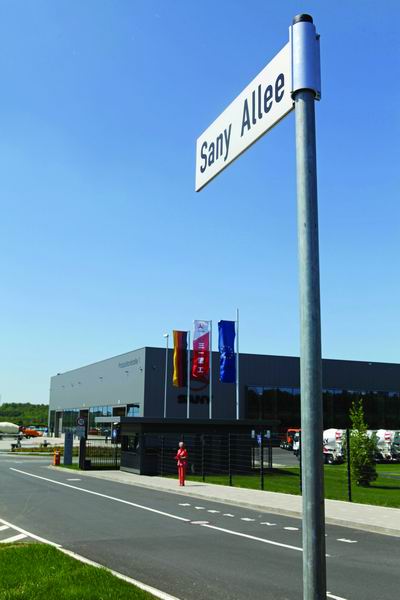
|
 |
|
Sany's new plant in Bedburg, Germany. Out of the around 1,000 Chinese investments in Germany, about 150 are green field projects. [Photo/China Daily] |
Sany's German growth is taking place as it also gains a manufacturing presence in India, Brazil and the United States.
Compared with German investment in China, China is a late mover in terms of investment in Germany.
Out of the around 1,000 Chinese investments in Germany, about 150 are green field projects.
A recent survey by consulting firm Ernst & Young among 400 executives of large and medium-sized Chinese companies found that Germany is the most attractive investment destination in Europe, and they are considering more acquisitions and joint ventures with German companies.
According to the survey, one in four Chinese managers viewed Germany as one of the three most appealing locations for investment worldwide. The other two were China itself, with 61 percent and the US, at 29 percent.
Within Europe, Germany was the most popular location among 63 percent of respondents, ahead of France at 13 percent.
Among the Chinese companies that are planning to invest in Germany, Europe's strongest economy, 9 percent of them are expecting to make acquisitions, while 56 percent prefer joint ventures.
As for the particular sectors, 57 percent said they were interested in mechanical engineering, with the automobile industry taking second place.
In March, the Berlin-based foreign trade and investment promotion agency Germany Trade & Invest reported that China became the biggest foreign investor in Germany in 2011, with 158 green field investment projects, ahead of the US with 110 and Switzerland with 91.
Telecom maker Huawei Technologies Co Ltd is China's biggest employer in Europe, with a 6,000-strong payroll across the continent, and 70 percent of these being local hires.
It has had a presence in Germany for more than 10 years, where it has around 1,600 employees in 20 locations, according to Olaf Reus, Huawei's director of public affairs and government relations in Germany.
Reus said Huawei is ranked the 17th most innovative company in Europe in terms of the number of patent applications approved.
Huawei is still expanding in Europe, despite the continent's financial and debt crisis.
"The crisis has not brought much crisis for us," said Carsten Senz, senior manager of public affairs and government relations for Huawei in Germany.
However, the European Commission is considering holding an investigation into whether Huawei has overused governmental subsidies and easy credit.
Despite this, Germany has relatively fair policies for investors. And the soaring trade volume between China and Germany has also pushed the investment higher.
Meanwhile, as China's former ambassador to Germany Wu Hongbo said, Germans are hardworking, disciplined and professional, and these qualities have helped build up German brands.
"All these are attractive to Chinese investors," said Wu.
Germany is famous for its sophisticated logistics network. It has about 100 airports, as well as well-developed rail, river and sea freight industries.
It ranks No 1 worldwide in terms of overall assessment of infrastructure and transportation, with France taking third place, Singapore in fourth place and the United States in eighth place.
Geographically speaking, Germany is located in the heart of Europe and it has easy access to other parts of the continent.
And in Germany, it is easy to open a company. It costs just one euro to open a micro company, while the registration capital for a joint venture is at least 25,000 euros.
All of these factors have helped Germany stand firm in the midst of the financial and debt crisis.
Linkenbach from Sany said that she hoped European politicians would find the best solution to the crisis in the interests of the people and the economy.
In Germany, the situation is currently not that bad, she said.
Linkenbach joined Sany in December 2010, and has witnessed a great deal of interest in what Sany has to offer.
"Our sales team visited our dealers and potential dealers, and asked them for cooperation or their interest in selling Sany machinery. Nobody said 'I do not want this Chinese machine.' They said instead, 'yes, bring me a machine, I am curious, I want to see it," said Linkenbach.
When German journalists ask her about the differences in working for a Chinese company, Linkenbach always says that there is no big difference because all companies want to make money, want to be successful and want to increase their market share.
But after pausing for a moment, she smiled and added: "The biggest difference to German companies, is that we have two menus in our canteen, German and Chinese."
Contact the writer at fujing@chinadaily.com.cn


 Washington to remain focused on Asia-Pacific
Washington to remain focused on Asia-Pacific RQFII target blue chips amid bear market
RQFII target blue chips amid bear market Australian recall for top two exporters
Australian recall for top two exporters China fears new car restrictions
China fears new car restrictions